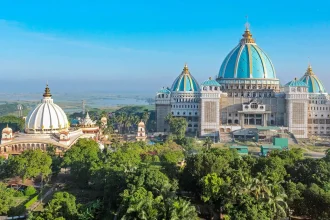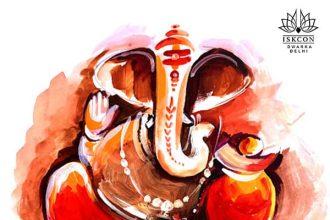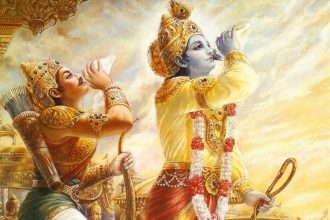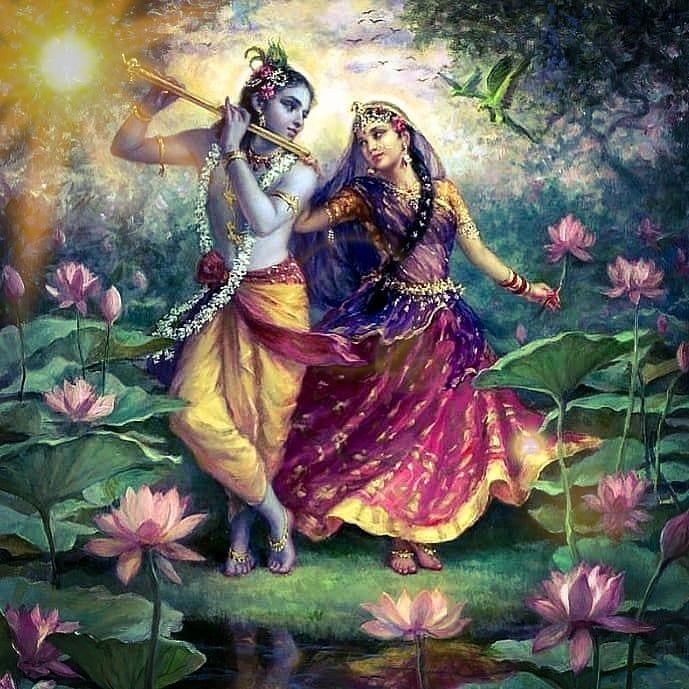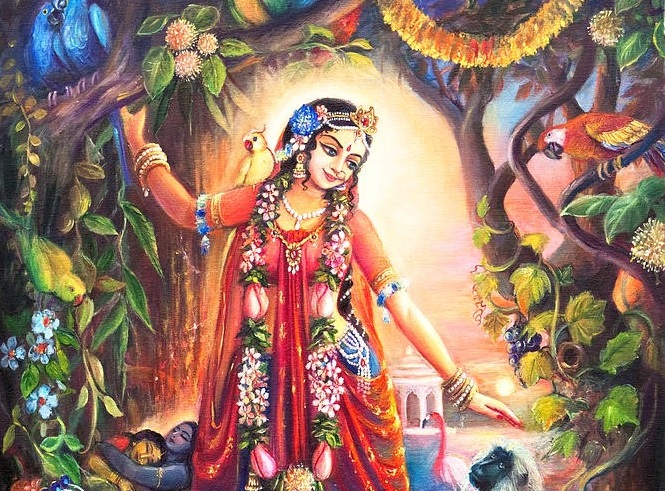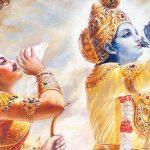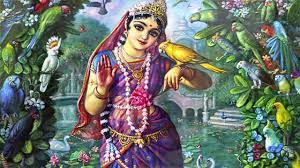The sage Kaśyapa was the son of the Prajāpati (forefather) Marīci and the grandson of Lord Brahmā, and was very learned. Dakṣa, another Prajāpati, gave him thirteen of his daughters in marriage. One of Kaśyapa Muni’s wives was known as Danu. She was very attractive and chaste, and Kaśyapa cared for her with love and devotion. Danu bore many mighty sons, one of whom was Vipracitti, who was exceedingly powerful and courageous. His son Dambha was self-controlled and a great devotee of Lord Viṣṇu. But he could not beget a son, so he became anxious. Therefore, to improve the situation, he went to Puṣkara Forest and performed severe austerities for a hundred thousand years. There, sitting in a steady posture and uttering the Kṛṣṇa-mantra, he practiced japa.
While practicing, an intolerable effulgence shot out from Dambha’s head and spread everywhere. It was so hot that all the demigods, sages and Manus were scorched by it. Thus, with Indra leading, they all sought shelter of Lord Brahmā.
Arriving at Lord Brahmā’s abode, they praised him and then informed him of the situation. After hearing about it, Lord Brahmā, to relate the problem to Lord Viṣṇu, led them to Vaikuṇṭha. There, with palms joined reverentially, they praised the great savior and Lord of the three worlds. The demigods then asked, “O Lord, we do not know what has caused this. Please tell us. What is that light by which we have been scorched?”
Lord Viṣṇu laughed and lovingly said, “O demigods, do not be afraid; remain calm and unshaken. No flood will occur and it is not the time of universal dissolution. The asura Dambha, one of my devotees, is performing asceticism to obtain a son. I shall soon bless him and that will quiet him.”
Encouraged by this, Lord Brahmā and the other demigods returned to their own realms.
Lord Viṣṇu went to Puṣkara where Dambha was practicing austerity. Seeing that Dambha was repeating His name, the Lord consoled him and asked, “What blessing do you want Me to grant you?”
Dambha offered obeisances with great devotion and praised the Lord repeatedly. Then he said, “O Lord of lords, O lotus-eyed one, obeisances unto You. O Lord of Lakṣmī, O Lord of the three worlds, please be merciful to me. Please give me a powerful and courageous son who will be Your devotee, be invincible to the demigods, and be a conqueror of the three worlds.”
Lord Viṣṇu asked Dambha to stop his austerity, granted him the blessing, and disappeared. As the Lord vanished, Dambha offered obeisance in that direction and returned home. Within a short while, his blessed wife became pregnant. She radiated an effulgence that illuminated the inner apartment of her residence. The soul residing in her womb was Sudāmā, one of Lord Kṛṣṇa’s leading cowherd companions who had been cursed by Śrīmatī Rādhārāṇī.
When Dambha’s chaste wife gave birth to a radiant-looking son, Dambha invited the sages to his place and had the post-natal rites performed. There was great jubilation and, on a favorable day, the father named him Śaṅkhacūḍa.
The son grew up in his father’s residence like the moon in its bright half. In his childhood, he learned all the traditions, customs, injunctions and prohibitions, and became resplendent. Engaging in childhood play, he delighted his parents and became the favorite of all the family members.
Later on, to obtain a boon from Lord Brahmā, Śaṅkhacūḍa performed austerities in Puṣkara for a long while. He concentrated his mind, restrained his senses and organs of action, and chanted a mantra that his preceptor, Jaigīṣavya, had imparted to him. Finally, Lord Brahmā went to Śaṅkhacūḍa to grant him a blessing. Lord Brahmā asked, “Tell me what boon you want.”
Seeing Lord Brahmā, the Dānava king bowed to him humbly and praised him with devotional words. Then he said, “Please make me invincible to the demigods, and also enable me to marry Tulasī.
“So be it,” Brahmā replied. Then he gave Śaṅkhacūḍa the divine amulet of Lord Śrī Kṛṣṇa. This amulet, called Sarvamaṅgalamaya (Conqueror of the World), was considered the most auspicious of all auspicious things in the world, for it guaranteed victory everywhere.
Brahmā continued, “Now you should go to Badarikāśrama. Tulasī Devī is performing penance there by her own will. You should marry her there. She is the daughter of King Dharmadhvaja.” Lord Brahmā then disappeared.
Śaṅkhacūḍa, whose austerity had now borne fruit at Puṣkara, tied that most precious amulet round his neck. He then set out for Badarikāśrama, his face beaming with joy.


